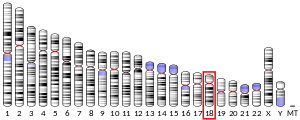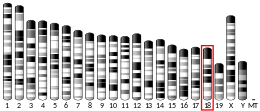From Wikipedia, the free encyclopedia
PIEZO2 Identifiers Aliases PIEZO2 External IDs OMIM : 613629 ; MGI : 1918781 ; HomoloGene : 49695 ; GeneCards : PIEZO2 ; OMA :PIEZO2 - orthologs Wikidata
Piezo-type mechanosensitive ion channel component 2 is a protein that in humans is encoded by the PIEZO2 gene .[5] [6]
Piezos are large transmembrane proteins conserved among various species, all having between 24 and 36 predicted transmembrane domains . 'Piezo' comes from the Greek 'piesi,' meaning 'pressure.' The PIEZO2 protein has a role in rapidly adapting mechanically activated (MA) currents in somatosensory neurons.[7] [8]
PIEZO2 is typically found in cell types that respond to physical touch, such as Merkel cells ,[9] [10]
^ a b c GRCh38: Ensembl release 89: ENSG00000154864 – Ensembl , May 2017^ a b c GRCm38: Ensembl release 89: ENSMUSG00000041482 – Ensembl , May 2017^ "Human PubMed Reference:" . National Center for Biotechnology Information, U.S. National Library of Medicine .^ "Mouse PubMed Reference:" . National Center for Biotechnology Information, U.S. National Library of Medicine .^
"Entrez Gene: Piezo-type mechanosensitive ion channel component 2" . Retrieved 2013-08-06 .
^ Wang L, Zhou H, Zhang M, Liu W, Deng T, Zhao Q, et al. (September 2019). "Structure and mechanogating of the mammalian tactile channel PIEZO2". Nature . 573 (7773): 225–229. Bibcode :2019Natur.573..225W . doi :10.1038/s41586-019-1505-8 . PMID 31435011 . S2CID 201116189 . ^ Coste B, Mathur J, Schmidt M, Earley TJ, Ranade S, Petrus MJ, et al. (October 2010). "Piezo1 and Piezo2 are essential components of distinct mechanically activated cation channels" . Science . 330 (6000): 55–60. Bibcode :2010Sci...330...55C . doi :10.1126/science.1193270 . PMC 3062430 PMID 20813920 . ^ Wang L, Zhou H, Zhang M, Liu W, Deng T, Zhao Q, et al. (September 2019). "Structure and mechanogating of the mammalian tactile channel PIEZO2". Nature . 573 (7773): 225–229. Bibcode :2019Natur.573..225W . doi :10.1038/s41586-019-1505-8 . PMID 31435011 . S2CID 201116189 . ^ Wu J, Lewis AH, Grandl J (January 2017). "Touch, Tension, and Transduction - The Function and Regulation of Piezo Ion Channels" . Trends in Biochemical Sciences . 42 (1): 57–71. doi :10.1016/j.tibs.2016.09.004 . PMC 5407468 PMID 27743844 . ^ Faucherre A, Nargeot J, Mangoni ME, Jopling C (October 2013). "piezo2b regulates vertebrate light touch response" . The Journal of Neuroscience . 33 (43): 17089–94. doi :10.1523/jneurosci.0522-13.2013 PMC 6618434 PMID 24155313 . ^ Coste B, Houge G, Murray MF, Stitziel N, Bandell M, Giovanni MA, et al. (March 2013). "Gain-of-function mutations in the mechanically activated ion channel PIEZO2 cause a subtype of Distal Arthrogryposis" . Proceedings of the National Academy of Sciences of the United States of America . 110 (12): 4667–72. Bibcode :2013PNAS..110.4667C . doi :10.1073/pnas.1221400110 PMC 3607045 PMID 23487782 . ^ Woo SH, Lukacs V, de Nooij JC, Zaytseva D, Criddle CR, Francisco A, et al. (December 2015). "Piezo2 is the principal mechanotransduction channel for proprioception" . Nature Neuroscience . 18 (12): 1756–62. doi :10.1038/nn.4162 . PMC 4661126 PMID 26551544 . ^ McMillin MJ, Beck AE, Chong JX, Shively KM, Buckingham KJ, Gildersleeve HI, et al. (May 2014). "Mutations in PIEZO2 cause Gordon syndrome, Marden-Walker syndrome, and distal arthrogryposis type 5" . American Journal of Human Genetics . 94 (5): 734–44. doi :10.1016/j.ajhg.2014.03.015 . PMC 4067551 PMID 24726473 .
Uher R, Tansey KE, Henigsberg N, Wolfgang M, Mors O, Hauser J, et al. (GENDEP Investigators; MARS Investigators; STAR*D Investigators) (February 2013). "Common genetic variation and antidepressant efficacy in major depressive disorder: a meta-analysis of three genome-wide pharmacogenetic studies" . The American Journal of Psychiatry . 170 (2): 207–17. doi :10.1176/appi.ajp.2012.12020237 . PMC 10416089 PMID 23377640 . Ahn MJ, Won HH, Lee J, Lee ST, Sun JM, Park YH, et al. (March 2012). "The 18p11.22 locus is associated with never smoker non-small cell lung cancer susceptibility in Korean populations". Human Genetics . 131 (3): 365–72. doi :10.1007/s00439-011-1080-z . PMID 21866343 . S2CID 16395362 . Del-Aguila JL, Beitelshees AL, Cooper-Dehoff RM, Chapman AB, Gums JG, Bailey K, et al. (February 2014). "Genome-wide association analyses suggest NELL1 influences adverse metabolic response to HCTZ in African Americans" . The Pharmacogenomics Journal . 14 (1): 35–40. doi :10.1038/tpj.2013.3 . PMC 3812324 PMID 23400010 . Coste B, Houge G, Murray MF, Stitziel N, Bandell M, Giovanni MA, et al. (March 2013). "Gain-of-function mutations in the mechanically activated ion channel PIEZO2 cause a subtype of Distal Arthrogryposis" . Proceedings of the National Academy of Sciences of the United States of America . 110 (12): 4667–72. Bibcode :2013PNAS..110.4667C . doi :10.1073/pnas.1221400110 PMC 3607045 PMID 23487782 . Wang X, Shaffer JR, Zeng Z, Begum F, Vieira AR, Noel J, et al. (December 2012). "Genome-wide association scan of dental caries in the permanent dentition" . BMC Oral Health . 12 : 57. doi :10.1186/1472-6831-12-57 PMC 3574042 PMID 23259602 . Xiao R, Xu XZ (November 2010). "Mechanosensitive channels: in touch with Piezo" . Current Biology . 20 (21): R936-8. Bibcode :2010CBio...20.R936X . doi :10.1016/j.cub.2010.09.053 . PMC 3018681 PMID 21056836 . Coste B (January 2011). "[Feeling the pressure? Identification of two proteins activated by mechanical forces]" . Médecine/Sciences . 27 (1): 17–9. doi :10.1051/medsci/201127117 PMID 21299953 . Dubin AE, Schmidt M, Mathur J, Petrus MJ, Xiao B, Coste B, et al. (September 2012). "Inflammatory signals enhance piezo2-mediated mechanosensitive currents" . Cell Reports . 2 (3): 511–7. doi :10.1016/j.celrep.2012.07.014 . PMC 3462303 PMID 22921401 . Luykx JJ, Bakker SC, Lentjes E, Neeleman M, Strengman E, Mentink L, et al. (February 2014). "Genome-wide association study of monoamine metabolite levels in human cerebrospinal fluid" . Molecular Psychiatry . 19 (2): 228–34. doi :10.1038/mp.2012.183 PMID 23319000 . S2CID 8713026 .
This article incorporates text from the United States National Library of Medicine , which is in the public domain .





